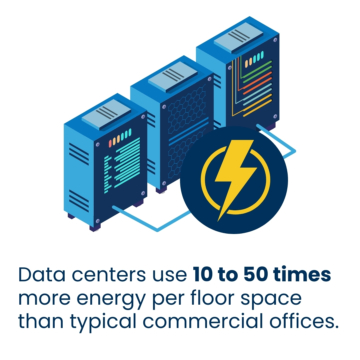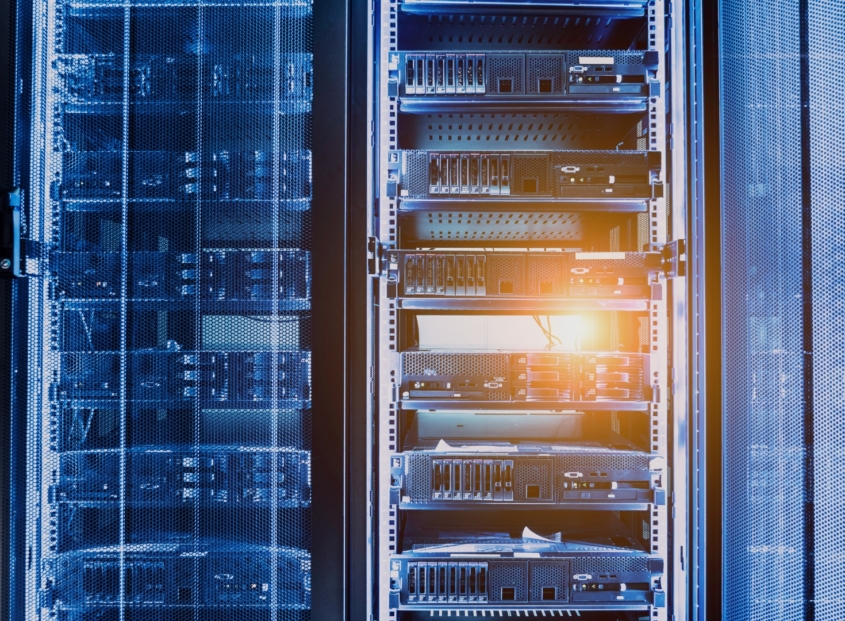Lower Your Data Center’s Electrical Bills with These Expert Tips
Did you know that data centers are among the most energy-intensive buildings, using 10 to 50 times more energy per floor space than typical commercial offices? These facilities account for about 2% of the total U.S. electricity consumption. As the nation’s reliance on information technology increases, energy use in data centers and servers is projected to rise. Fortunately, there are numerous opportunities to reduce energy consumption in data centers.
total U.S. electricity consumption. As the nation’s reliance on information technology increases, energy use in data centers and servers is projected to rise. Fortunately, there are numerous opportunities to reduce energy consumption in data centers.
Over the past decade, data center development has boomed with a global server growth of 674%. Here in the Pacific Northwest, we’ve seen rapid expansion in data center infrastructure, culminating in 185 centers and more on the way.
With all this recent growth maximizing electrical efficiency is one key way to maintain top performance.
Data Center Energy Consumption & Efficiency
Data centers are expected to operate 24/7 and produce a high energy output. This high availability can lead to excessive energy usage and environmental impacts. In 2022, data centers consumed 1- 1.3% of worldwide energy demand. In the U.S., energy usage is expected to reach 35GW by 2023, nearly double the 2022 numbers.
Data center owners and operators in the Pacific Northwest have opportunities to adopt energy-efficient plans to improve performance and reduce energy consumption.
7 Ways to Enhance Data Center Efficiency
Implementing energy-efficiency solutions can significantly lower operational expenses and environmental impact. If you’re seeking energy-saving upgrades for your existing data center these seven tips are essential starting points.
1) Optimize Cooling Systems
Data centers have zero downtime and, as a result, need cooling systems to prevent overheating and maintain hardware integrity. Air-side economizers utilize cool outside air to maintain proper temperature, while water-side economizers rely on cooling towers and chilled water to keep equipment cool.
According to EnergyStar, air-side economizers can save up to 60% on energy costs, and water-sized economizers can save up to 70%.
2) Use Energy Star-Rated Equipment
Energy-efficient hardware can save up to 30% on utility costs, so upgrading to certified energy-saving equipment can reduce output.
3) Rethink Hot & Cold Aisle Containment
Arrange your server racks so that the fronts of the servers face each other to separate hot and cold air streams and improve cooling efficiency. Contain or enclose your server racks to prevent cold and hot air flow from intermingling.
4) Disable Non-Working Servers
According to Energy Star, 15% to 30% of the energy is still drawn even when not computing. Simply decommissioning these outdated servers can do wonders for energy reduction.
5) Turn to Renewable Energy
The Pacific Northwest has a wealth of renewable energy sources, including solar, wind turbines, and hydrogen, to help power data centers. Moreover, Washington and Oregon have tax and grant incentives for businesses implementing green tech, which means additional savings.
6) Perform Routine Audits
As new technologies emerge and data centers expand, it’s essential to conduct energy audits to catch any inefficiencies immediately. Also, regular equipment maintenance keeps all your equipment performing at its best.
7) Hire Electrical Professionals
Data centers are often thought of in terms of IT management. However, the components themselves also exist in the realm of electricity. Hiring professional electricians to help install, check, and maintain equipment can ensure optimized efficiency and safety.
Hire a Local Electrician or Electrical Contractor Near You
The future of data centers is expected to grow and evolve. As an owner or operator, you want to ensure your equipment is energy-efficient and top-performing. Working with licensed and bonded electricians and contractors is paramount to staying up-to-date with tech and energy efficiency practices.
If you need professionals in the Pacific Northwest trained in renewable resources and new technologies, the NECA–IBEW Local 48 partnership offers a list of expert electrical professionals for your business.



